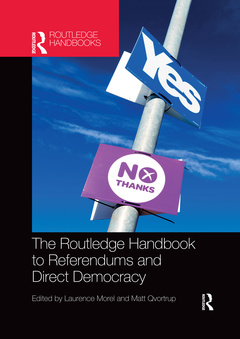The Routledge Handbook to Referendums and Direct Democracy
Coordonnateurs : Morel Laurence, Qvortrup Matt

Over the last 30 years referendums have played an increasingly important role in determining government policy. Recent high profile referendums in Scotland, Catalonia and Ukraine have continued the movement towards independence referendums following decolonization and the end of the Cold War. The Greek bailout referendum and Britain?s vote on membership of the EU reflect a tradition of European states giving their people a direct say in the transfer of sovereign powers to the European Union seen through the ratification of key treaties such as Maastricht, Amsterdam, Nice and Lisbon. This Routledge Handbook covers key aspects and issues of direct democracy and referendums throughout the world including:
?their history;
?when, why, where, how and on which issues referendums are held;
?why some referendums are more democratic than others;
?how referendums are won;
?whether they produce good policies;
?if referendums increase participation and improve the quality of representative democracies;
?do referendums increase trust in democracy and the political actors;
?the impact of new technology on the possibilities, methods and frequency of direct public political participation;
?how they should be regulated.
Covering other related areas such as recall, citizen juries and random selection, this compendium is an indispensable guide to referendums and the workings of modern democracy.
Foreword by Vernon Bogdanor Introduction Part I. The History and Variety of Referendums 1. The History of Referendums and Direct Democracy 2. Types of Referendums, Provisions and Practice at National Level Worldwide 3. Local Referendums: A Comparative Assessment of Forms and Practice 4. Methodological Issues: Popper, Paradigms and Historical Perspectives on Referendum Research. A Case of Pluralism Part II. The Politics of Referendums: Causes and Regime Context 5. Views on Referendums: Is there a Pattern? 6. Why Referendums? On Appearances and Absences 7. Referendums and Consensus Democracy: Empirical Findings from 21 EU Countries Part III. The Democratic Quality of Referendums: Criteria, Practices, Regulations 8.The Democratic Criticism of Referendums: The Majority and True Will of the People 9. The Democratic Potential of Referendums: Intrinsic and Extrinsic Limitations 10. Democratic Credentials and Deficits of Referendums: A Case Study of the Scottish Independence Vote 11. People Concerned and People Entitled to Vote: The Example of Sovereignty Referendums 12. The Expression of Popular Will: Does the Wording of a Referendum Question Matter? 13. The Expression of Popular Will: Do Campaigns Matter and How Do Voters Decide? 14.The Strength of Popular Will: Legal Impact, Implementation and Duration 15. Existing Regulations and Recommended Best Practices: The Example of the USA Part IV. Voting at Referendums 16.Voting Behaviour in Direct Democracy Votes 17.Picking Winners. Forecasting the Results of EU Referendums 1972-2016 18.The Formation of Opinions at Referendums: The Application of the Screening Theory Model 19. Are Referendums a Machinery to Turn Out our Prejudices into Rational Choices ? An Unfortunate Answer of Sociophysics 20.How Elections Shape Campaigning Effects in Direct Democracy Part V. Policy and Political Effects of Referendums 21. Referendums, Minorities and Individual Freedoms 22. Referendums on European Integration: Crisis-Solving or Crisis-Inducing?23. Do Referendums Make Better Citizens? TTThe Effects of Direct Democracy on Political Interest, Civic Competence and Participation 24. Brinkmanship and Backsliding: How Governments Deal with Referendum Decisions 25. Effects of Referendums on Party Cohesion and Cleavages: Empirical Findings from 21 EU Countries Part VI. Related Direct Democratic Institutions: An Overview 26. Recall Referendum Around the World: Origins, Institutional Designs and Current Debates 27. Deliberative Mini-Publics in Democratic Systems 28. Nothing Fails Like Success: Teledemocracy and Deliberative Polling 29. Sortition, Direct Democracy and Indirect Democracy Appendix 1.Types of Nationwide Referendums Provided for in the 195 Countries of the World (2016)Appendix 2. Practice of Nationwide Referendums in the 195 countries of the World (1940-2016)
Laurence Morel is Professor of Political Science at the University of Lille, France and affiliated to the Centre de Recherches Politiques de Sciences Po Paris (CEVIPOF), Francec.
Matt Qvortrup is Professor of Political Science and International Relations at Coventry University, UK.
Date de parution : 02-2020
17.4x24.6 cm
Date de parution : 12-2017
17.4x24.6 cm
Thème de The Routledge Handbook to Referendums and Direct Democracy :
Mots-clés :
Direct Democratic; campaign; Ukraine European Union Association Agreement; popular; UK Referendum; initiatives; EU Referendum; Direct Democratic Votes; Electoral Commission; Mandatory Constitutional Referendum; Referendum Campaign; Policy Issues; Mandatory Referendum; Sovereignty Referendums; Direct Democratic Instruments; Deliberative Mini-publics; Direct Democratic Procedure; Matt Qvortrup; De Vreese; Scottish Referendum; Direct Democratic Institutions; Brexit Referendum; DP; Referendum Process; Venice Commission; EU Accession Referendum; Conseil Constitutionnel; Local Direct Democracy



